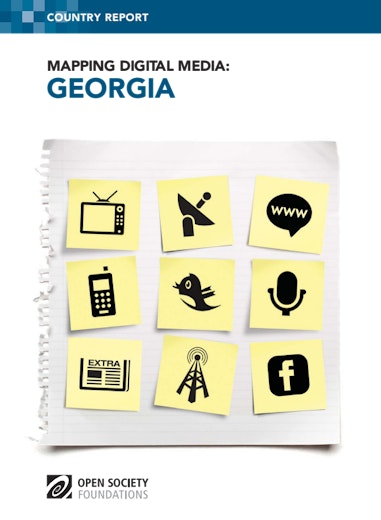The Mapping Digital Media project examines the global opportunities and risks created by the transition from traditional to digital media. Covering 60 countries, the project examines how these changes affect the core democratic service that any media system should provide: news about political, economic, and social affairs.
Digitization in Georgia has two speeds: there are plentiful examples of the swift adoption and innovative use of digital media, but just as abundant is the evidence of procrastination and reluctance to embrace new opportunities. It also presents two faces: a free and dynamic online environment and a heavily government controlled offline world. These contradictions have a direct impact on the overall news offer and on media consumption patterns.
This report finds that the momentous change in ownership transparency regulation and the dynamic and free online environment are the most notable success stories since 2005. Yet these achievements are overshadowed by the lack of independence of the broadcasting regulator and the public broadcaster, as well as the slow pace of digital transition.
In order to promote positive change, three kinds of reform need to be undertaken. First, the process of drafting the legal framework for digital switch-over must be made transparent and show results in the near future if the country is to be ready for the transition before the switch-off date in 2015. The public interest provisions, must-carry rules, and transparent spectrum allocation and gatekeeping should be given priority. Second, with public awareness of the purpose and implications of switch-over virtually non-existent, an information campaign and public debate need to start without delay.
Finally, the independence of two key institutions, the Georgian National Communications Commission and the Georgian Public Broadcaster, needs to be strengthened. In both cases, this can be done by adopting clearer regulatory safeguards against government interference, enforcing transparency, and ensuring civil society participation in selection procedures.
Download
-
Mapping Digital Media: Georgia (489.82 Kb pdf file)
Download the complete 101-page report.
Read more
Voices
What Does Independent Journalism Look Like in the Digital Age?

Journalists and media organizations can find themselves repressed because of inadequate or deliberately repressive policy. Mapping Digital Media examines the situation in 56 countries.
Voices
Does Digital Media Mean Better Media?
From Montenegro to Nicaragua to China to Egypt, has digital media improved access to good-quality journalism?
Voices
The Impact of Digital Media on Sweden
Sweden offers an intriguing test case for studying the impact of media digitization on journalism and democracy.
